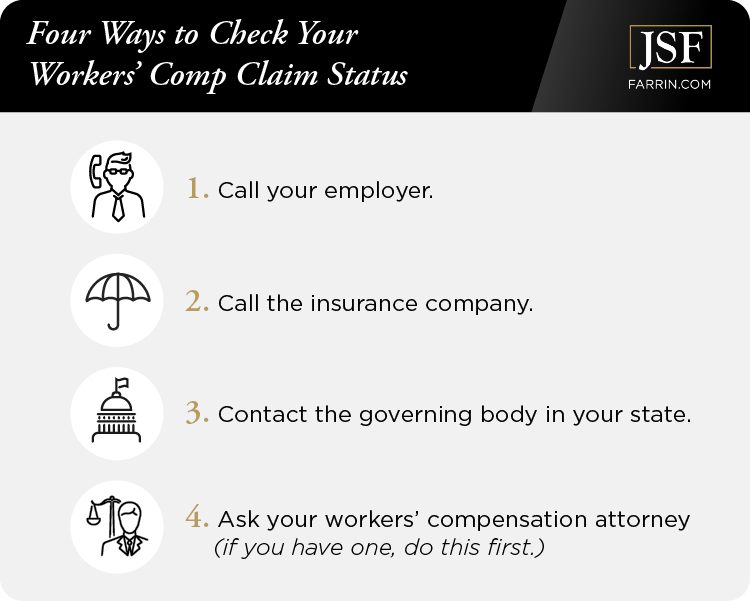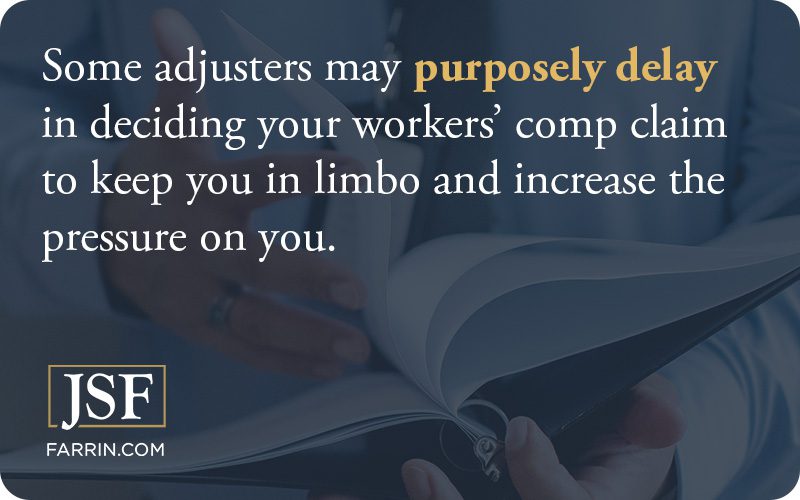If you’re waiting for a decision on benefits after an injury at work, it may feel like you’re in workers’ comp limbo. As an injured worker, your bills are piling up while you’re unable to earn a wage. You may also be paying your medical costs out of pocket.
It’s understandable that you’d like to know what’s happening with your case. Is there a way to check the status of your workers’ compensation claim?
While some states have an online portal or other simple way to check the status of a workers’ comp claim, many, like North Carolina, are not so fortunate. Similarly, in South Carolina, not all carriers have a way to check your claim online.
Here’s what you can do instead, depending on your state.
In this article, I’ll discuss each method and answer other important related questions such as, if your claim is approved, when will workers’ compensation benefits like wage replacement benefits and medical treatment coverage begin?
4 Ways to Check the Status of a Workers’ Comp Claim
Assuming you’re not in a state with a responsive online system, you generally have four options to check your claim status. You may have to take one or more of these steps to seek an answer, which may be frustrating to deal with as medical bills mount after your workplace accident.
#1: Contact Your Employer

Unfortunately, for many injured workers, their employer either is unwilling or unable to help them check the status of their claim.
Learn More: It’s Lawyers and Workers vs. Employers and Insurers
#2: Contact the Workers’ Compensation Insurance Provider
Why not go to the source, right? The workers’ compensation insurance provider is the one who’s hopefully going to be paying your benefits, so they know the status of your claim. The truth, which comes as a shock to many injured workers, is the insurance company is not on your side.
Most likely, you’ll get some general information regarding where you are in the claims process, but no deadline or other useful information. Some adjusters may purposely delay in deciding your workers’ comp claim to keep you in limbo and increase the pressure on you.
This can be a case where the insurance company denies a claim without officially denying it – they ignore it. It’s a tactic some may use. The longer they can wait, the more a worker is going to feel the effects of those lost wages, medical bills, and the ongoing pain of their workplace injury. Are you going to sit around and lose your home for a claim, or are you going to find other work?
Some may be counting on you to just give up.
Even in states that have a deadline required by law, some adjusters may let your claim sit for ages. I’ve seen claims go without a response for more than a year in North Carolina, for instance – and the deadline to respond is 30 days. The insurer’s only penalty for missing that deadline is a paltry fine.
So what can you do? How do you appeal denied workers’ compensation claims when they haven’t yet been denied? If you find yourself in this situation, consult with an experienced workers’ comp attorney.
#3 Contact the Government Commission that Regulates Workers’ Compensation
In most states, there is some kind of government body that regulates and oversees workers’ compensation insurance companies and employers and resolves disputes as needed. There’s the North Carolina Industrial Commission (NCIC), for example. The South Carolina Workers’ Compensation Commission (SCWCC) works similarly.
You can try to obtain a status on your claim through the NCIC. That’ll usually involve your claim number or whatever they use to identify your case.
However, not all of these state commissions operate the same, offer the same services, or handle claims in a way that lets them update you on your claim status. The NCIC, for example, only keeps track once a claim is in the appeals process (and even then, the “status” they provide may not tell you anything useful). In South Carolina, there is no way to check your claim status through the Workers’ Compensation Commission.
On top of that, the methods for contacting these agencies aren’t always clear or up to date.
#4 Have a Workers’ Compensation Attorney Handle It

Claims happen in fairly distinct phases. An attorney is your guide and keeps you fully informed at every stage:
Phase 1: Getting the insurance company to respond to the claim
Sometimes, the insurance company follows the rules and deadlines, and your workers’ compensation claim is processed in a timely manner. Once you get an official, written response, you can move on to the next step. For my clients, if the insurer doesn’t respond, I typically file a motion for a hearing immediately. That usually gets them moving.
Phase 2a: Appealing a denied claim
Insurers may deny an injured worker’s claim for benefits. Most insurance companies are for-profit, and they make more by paying out less. To try to avoid denials, I work to try to make the initial claim rock solid, with medical documentation and anything else I can find that might persuade the insurer to accept responsibility for my client.
Appealing a denied claim can be complex. It may require one or more hearings or appeals to the state commission. There’s also a way that the insurer can begin paying benefits while reserving the right to deny the claim later after investigating. I try to protect my clients from a delayed denial once they’re getting benefits.
Phase 2b: Managing and negotiating an accepted claim for benefits
If the claim is accepted, I work to try to ensure my client is getting reimbursed for appropriate medical care they got before the claim was accepted, and that any related future medical treatment is covered. I also seek to ensure that the insurer accurately calculates the wage replacement benefits for my client and delivers their checks regularly.
Learn More: Temporary partial disability benefits & temporary total disability lost wage benefits
Phase 3: Handling the insurer and fighting for a client to recover as much as possible
Just because you receive benefits doesn’t mean the work is done. Your workers’ compensation claim is still in process, and things can still happen that jeopardize your health and rights. For example, what if you disagree with the treating physician about your diagnosis or care? What if your medical treatment isn’t making you better and no one is listening? What if you need a procedure and the insurance company delays or denies it?
As a workers’ compensation attorney, this is my day-to-day battle: Helping a client through a workers’ compensation claim, fighting for the medical care they need and all the wage benefits they may deserve to help them meet their living expenses.
Sometimes, insurers don’t tell you everything. A workers’ compensation lawyer can alert you to benefits you may be entitled to and should be receiving and generally take the stress of the workers’ compensation case off of you.
Phase 4: Negotiating for a lump sum settlement if necessary
If the injured worker is still suffering from a work-related injury but has healed as much as possible according to the physician appointed by the insurer, they’ve likely suffered a permanent injury. This generally entitles the worker to permanent partial or permanent total disability benefits, though workers’ compensation benefits don’t really last forever.
At some point, the insurance company likely wants the worker off their rolls, and the worker wants to move on with his or her life. That’s when a settlement may come into play. This can be the most critical part of any workers’ comp claim for a couple of reasons.
1) This is the last chance to get compensation for the injury. Once the case is settled, the employer and insurer are almost always off the hook, no matter what comes up.
2) Seeking the maximum amount possible is vital, both to cover any future medical costs and to make up for any drop in income the worker may suffer due to their permanent injury.
Learn More: Your Workers’ Compensation Settlement
Call an Experienced Workers’ Compensation Attorney
Other than you, there’s one person working to help protect your rights and seek maximum benefits on your behalf: your workers’ compensation attorney. Your attorney can help you seek the full benefits you may deserve and fight back against insurance company delays and other tactics.
Your attorney is your guide through a complicated system and can increase your odds of success at every stage.
Contact the Law Offices of James Scott Farrin

We work on a contingency fee basis, which means having an attorney safeguarding your rights and answering your questions as soon as possible doesn’t cost more (or anything upfront) – we don’t bill by the hour.2 Since 1997, our firm has recovered more than $2 billion in total compensation for more than 73,000 people.1
Call us today at 1-866-900-7078 or contact us online to get clarity on your case at no obligation with a free case evaluation.






